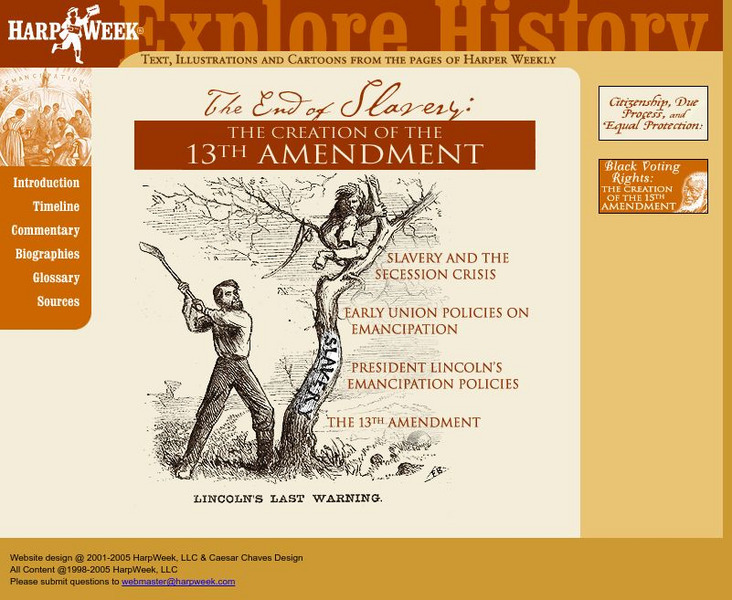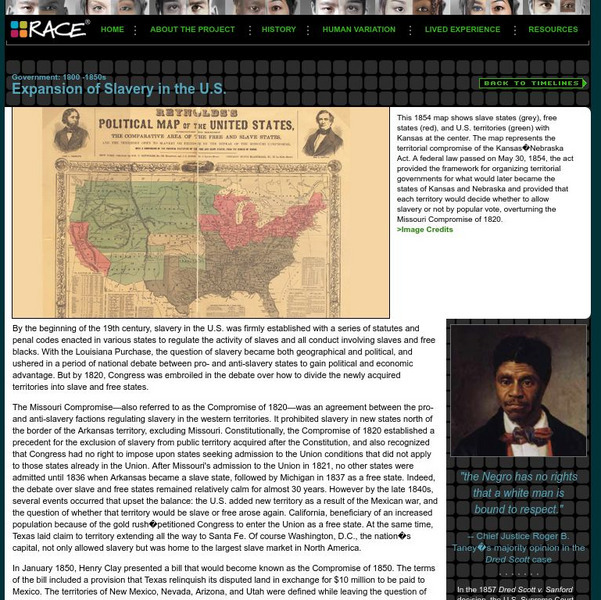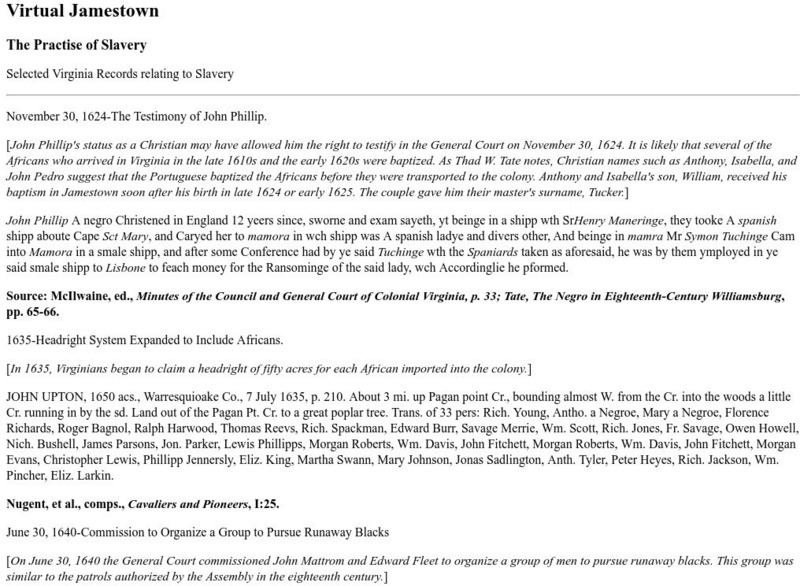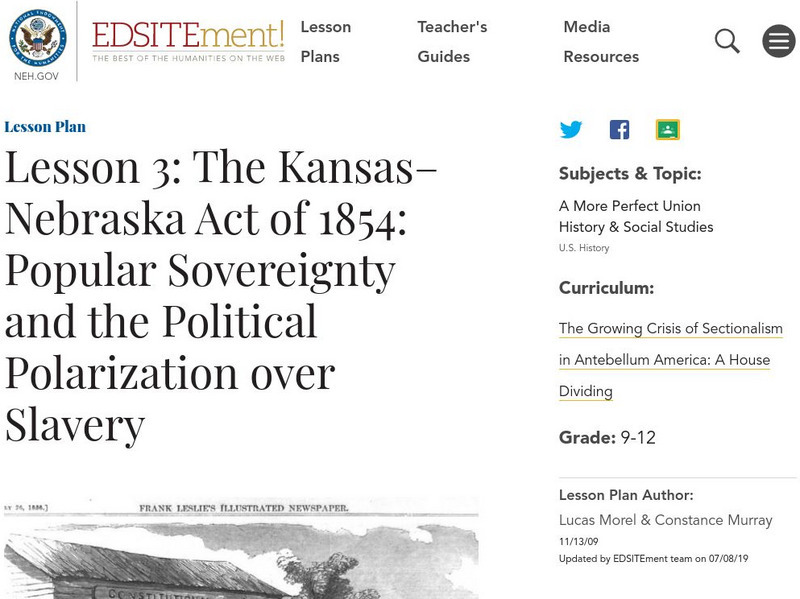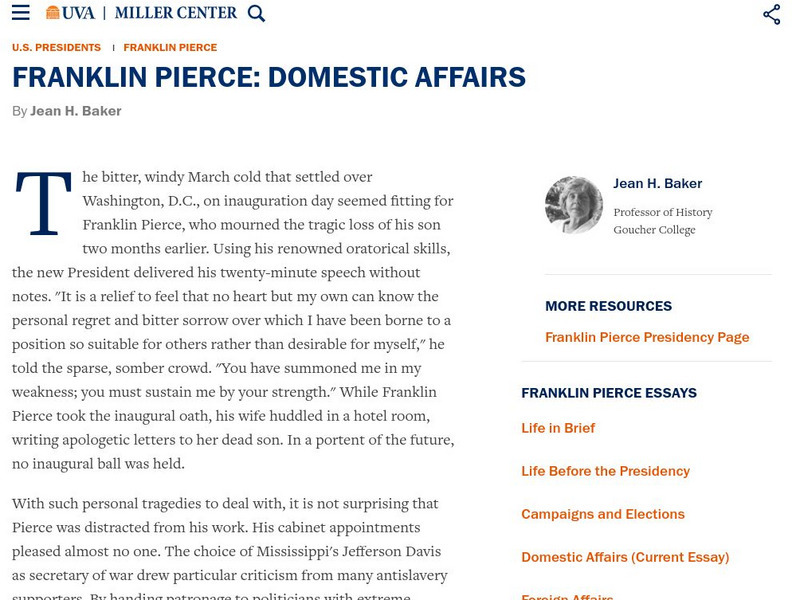Curated OER
The Industrial Revolution
Eighth graders examine the time period of the Industrial revolution in American history. In this American History lesson, 8th graders read the chapter on this time period. Students create a presentation on this time period to teach...
Stanford University
Sheg: Document Based History: Reading Like a Historian: Slavery in Constitution
[Free Registration/Login Required] Students use primary source documents to investigate the central historical question about slavery. In this investigation students consider the positions of delegates to the Constitutional Convention...
Digital History
Digital History: The Constitution and Slavery
The issue of slavery was a contentious one during debates in the Constitutional Convention. Read about the various issues, the quotes of several of the delegates, and see how the word "slave" is not even mentioned in the Constitution....
Other
Mount Vernon Ladies' Association: 5 Issues at the Constitutional Convention
There were 5 main issues that the delegates to the Constitutional Convention argued and debated: Slavery, Representation, State v. Federal Powers, Commerce, and Executive Powers. Analyze these issues by reading the following summaries,...
PBS
Wnet: Thirteen: Slavery & Making of America: The Slave Experience: Men, Women & Gender
Learn about issues related to slave gender roles at this PBS series site that features illustrations and documents dating back to the Colonial, Antebellum, and Reconstruction periods in American history.
University of New Brunswick (Canada)
The Ward Chipman Slavery Brief
A great reference source about anti-slavery issues in Canada during the 19th century. In 1800, Ward Chipman tried to defend the right of a New Brunswick slave woman's right to freedom. Here you can read the full transcript of the Chipman...
Digital History
Digital History: Slavery and the Slave Trade [Pdf]
Read reconstructions of debates by delegates to the Constitutional Convention as they attempted to come to terms with slavery, the slave trade, and how to address the issue in the Constitution so all states would be willing to ratify it....
Georgetown University
Georgetown: Georgetown Slavery Archive Black Students at Georgetown
In this podcast conducted in the format of a Radio Show, Georgetown students Juliette Browne (GU '18) and Ndeye Ndiaye (GU '18), address the impact of slavery on the legacy of education inequality and college preparedness in black...
Harp Week
The End of Slavery: The Creation of the 13th Amendment
What a wonderful resource for researching the attempts to solve the issue of slavery prior to the Civil War, and the eventual ratification of the 13th Amendment. Find a timeline of legislation limiting the spread of slavery from 1787...
Other
American Anthropological Association: 1800 1850s: Expansion of Slavery in the Us
Outlines the political events prior to the Civil War as the United States expanded its territories to include new states and conflicts arose over the issue of slavery.
Huntington Library
Huntington Library: Slavery: A Crisis in the Making [Pdf]
This lesson plan looks at the issue of slavery and the role it played in the American Revolution and the founding of the new Republic. Includes background information for the teacher. Students participate in performing a reader's theater...
Scholastic
Scholastic: The Underground Railroad: Escape From Slavery
Imagine being a slave escaping from the South in 1860, and heading to freedom through the underground railroad. Students will hear from first-person accounts and investigate other primary sources from the 1800s.
Henry J. Sage
Sage American History: Sectional Issues, 1815 to 1860
Article describes the sectional issues present in America between 1815 and 1860, including tariffs, banking, and the divisive issue of slavery.
Other
Virtual Jamestown: The Practice of Slavery: Selected Virginia Records
This site provides the original text from colonial Virginia concerning council and court records on slave issues such as the laws concerning runaways, their punishments, deeds of ownership for specific slaves, etc.
Wikimedia
Wikipedia: Stephen A. Douglas
he A lengthy biography of Stephen Douglas. Discusses his involvement in politics, in particular, his involvement with the slavery issue, his runs for presidency, his famous debates, and much more.
Digital History
Digital History: The Revival of the Slavery Issue
A brief account of how the Kansas-Nebraska Act split apart party coalitions and helped create the new Republican Party. See who joined this party and read about its goals.
Ohio State University
Osu History Teaching Institute: African American Slavery
After an introduction to slavery in the 1800s and the role Ohio played in this issue, students will analyze two primary source documents from two very different people.
University of Groningen
American History: Outlines: The Debate About Slavery
Article outlines the issues of debate over slavery and the compromises made while writing the Constitution.
National Endowment for the Humanities
Neh: Edsit Ement: The Kansas Nebraska Act of 1854
An exploration of how the Kansas-Nebraska Act of 1854 impacted the debate between free and slave states, and the precarious political equilibrium. It looks at how Stephen Douglas tried to avoid a national conflict in the debate over...
Digital History
Digital History: Lincoln vs. Douglas [Pdf]
The Licoln-Douglas debates pitted two great speakers who were espousing different courses for the country in regard to the issue of slavery. Read a snopsis of their seven debates and see what four major issues they debated. [pdf]
Other
Course Notes: Us History: 1840 1877: Expansion and Slavery
A list with short descriptions of the issues and events that impacted the expansion of the frontier, with slavery being the most significant issue.
Digital History
Digital History: Compensation for Slavery [Pdf]
Read the arguments for and against giving reparations to today's African Americans to atone for the slavery their ancestors endured in 18th and 19th century America. Also included are results from a poll conducted by the magazine, Black...
Claremont Institute
Founding.com: John C. Calhoun
A collection of speeches given by John C. Calhoun on why slavery should not be abolished.
University of Virginia
Miller Center at Uva: u.s. Presidents: Franklin Pierce: Domestic Policies
As Franklin Pierce became president, the question of slavery in the territories occupied his handling of his domestic policies. Read about the passage of the Kansas-Nebraska Act and the resulting turmoil in Kansas as abolitionists and...




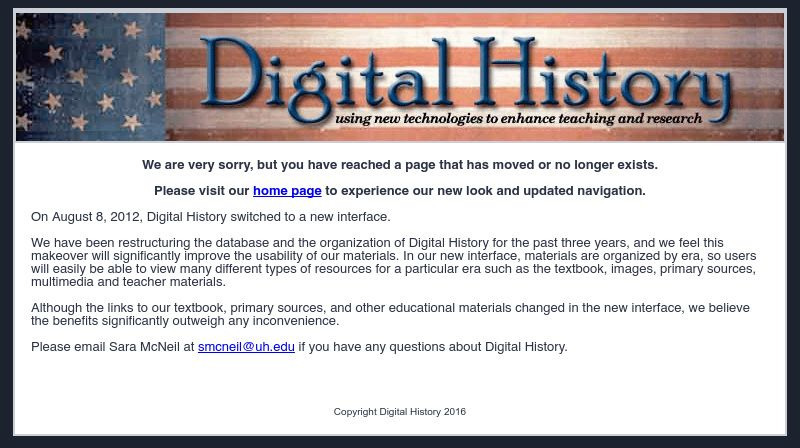

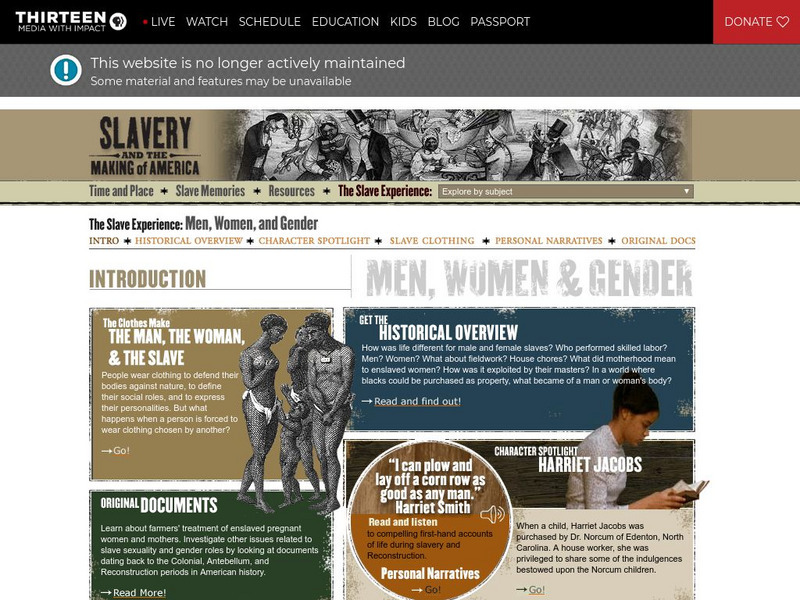

![Digital History: Slavery and the Slave Trade [Pdf] Website Digital History: Slavery and the Slave Trade [Pdf] Website](https://d15y2dacu3jp90.cloudfront.net/images/attachment_defaults/resource/large/FPO-knovation.png)
